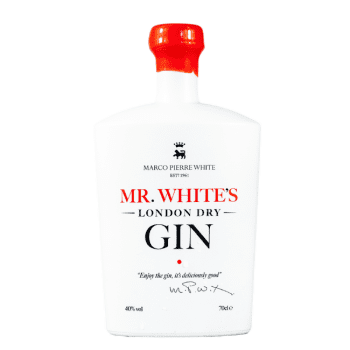Marco Pierre White on keeping gin simple
By Rupert HohwielerWe caught up with chef Marco Pierre White on his gin preferences and launching his own brand across the UK.

Marco Pierre White’s initial run with his gin, Mr White’s Gin, was a short one, launched as a small batch limited edition release during the Covid-19 era in June 2021, which the chef tells us was “unfortunate timing”.
However, in April this year, White brought it back. Explaining the decision to The Spirits Business, he says: “The reality is that it’s a better time to do it now.”
The chef has made a statement of intent with the relaunch, too, nabbing a nationwide deal with supermarket group Sainsbury’s, where it can be found in 100 stores across the country. That has been backed that with a fresh bottle design – from black to now white with a red wax seal – and a lower price point (£32.99/US$45 down from its former tag of £54.95/US$77).
Regarding the change in bottle, White says the new design has a “a sense of occasion” with its red wax seal, and for the price: “I think that it’s important to create something that’s deliciously affordable and the reality is that making the most delicious gin, and the most average gin, basically is the same price.”
He notes that securing the nationwide listing at Sainsbury’s was “an opportunity too good to walk away from. They’ve opened their doors and allowed us to put it on their shelves – it’s a great privilege.
“Lets not forget, Sainsbury’s opens its doors to the people and every demographic walks through. That’s why it’s so good that it’s allowed us to have Mr White’s Gin in there.”
Comparisons to cooking
One thing that has remained the same is White’s commitment to a traditional London Dry style of gin.
“I’m not a fan of flavoured gins. I think if you want something that’s flavoured then get a tonic that’s flavoured, as a gin is a gin”, he says.

White’s gin is therefore juniper-forward and traditionally-produced, by master distiller Chris Sadler.
“Chris is a genius. He’s very, very good at what he does, he has this understanding, or philosophy, and it’s incredibly simple,” White says.
“I respect his talent and he knows when it’s right and he knows when it’s wrong.”
Sadler’s approach to gin is akin to White’s in cooking, where his philosophy is ‘simplicity is the secret to everything’ and ‘the more you do to something, the more you move away from what it is supposed to be’.
“I’m a great believer in simplicity, so when I make something, like a sauce, I keep it simple,” White says.
He may have retired his Michelin stars, but his 25-year-plus career as a chef at the forefront of the UK’s restaurant scene has shaped how he wants the gin to taste and smell.
“I don’t put too many ingredients in because I want it to taste how it is meant to taste. The more you put in, the less that will be.
“For example, when making roast jus, I just use onions and garlic. I want to taste the roasted juices for whichever meat I’m working with, whether that’s lamb, chicken or pigeon. It’s the same for Mr White’s Gin.
“You need to know when to stop adding too many flavours. The secret to making the perfect gin is no different to making the perfect sauce. You have to have that balance.”
The botanicals in Pierre White’s gin – French lavender, lemon peel from Greece, orange peel from Spain, and liquorice sourced in France, among others, are also a product of his culinary preferences.
“They’re born out of my love for French cuisine,” he says. “I like sunshine flavours, Italian and Spanish food, but I think my favourite food in the whole world is from the south of France, and Provence. That’s why the gin has a lot of lavender in it.”
Traditionalist
As for how White consumes gin, he’s still a gin and tonic guy. “It’s the number one pre-dinner drink, isn’t it? If you did a survey across the whole of Great Britain, I bet gin and tonic would be the number one selling pre-dinner drink. In the old days, the headmaster used to say ‘can I get you Sherry?’ and they’ve since stopped that and changed it to ‘can I get you a gin and tonic?’.
“This was when we were invited to see the headmasters about your children, 30 years ago”, he adds, clarifying that it’s not when he himself was at school.
And for White’s preferred tonic? “Call me old-fashioned, boring, a traditionalist… I always have Schweppes. I think it’s the best tonic in the world for gin. It’s a natural match, like basil and tomatoes, cheese and onion, salt and vinegar. All wonderful combinations like gin and tonic, and Schweppes is the original tonic. I also think gin has to be quintessentially English.”
For the future, White says getting his gin in top bars and country house hotels would be nice. “It’s a smart gin and I hope my name creates enough curiosity for people to try it.”
But he’s aware that gin is a “swamped” market. “The reality is like with everything, it takes time. If you force things they tend to break – you have to let things grow, organically and naturally. It will find its home in the end.”
Related news
Salford Rum maker launches its first gin
